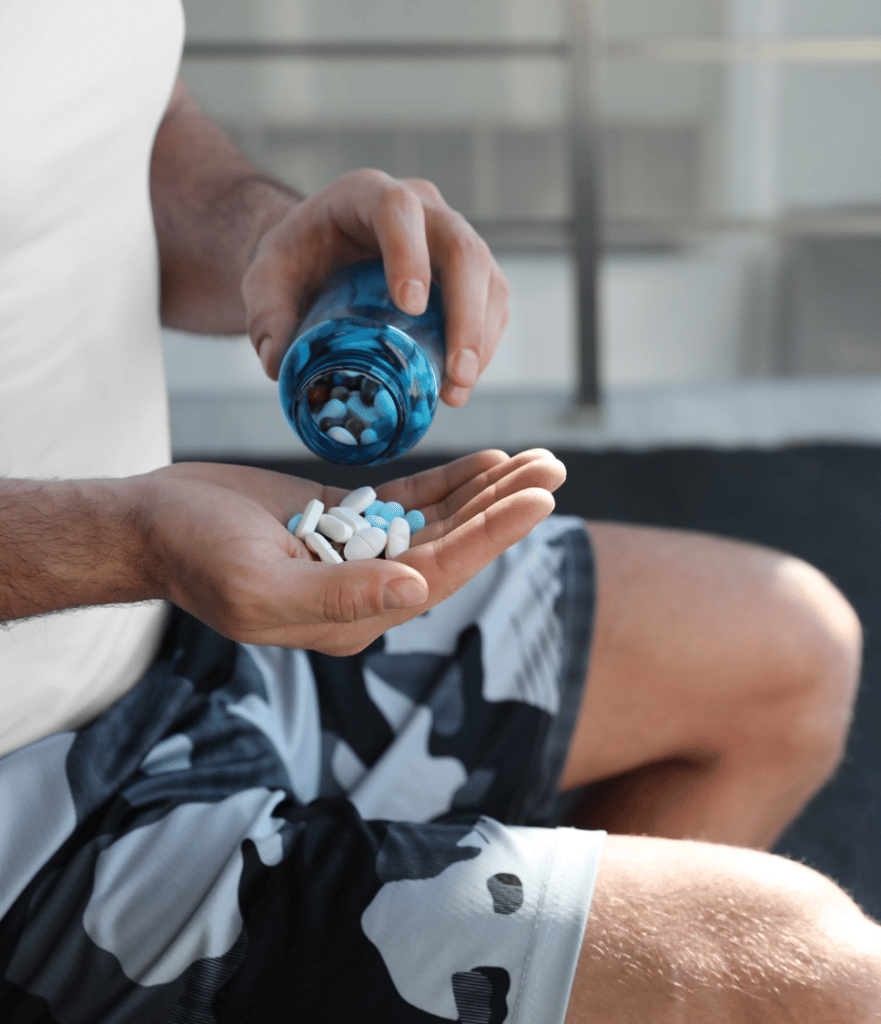Drug Rehab for Athletes
College and professional athletics are fantastic ways to compete, master teamwork and leadership, and stay in shape – but an athlete’s life isn’t always gold.
It can be challenging to deal with the physical and emotional pressures competitive athletes experience.
- Approximately 52% of professional football players admit to using opioids, while up to 89% of college athletes report using alcohol to deal with injuries or stress.
- Many athletes are driven by a fear of failure, taking performance-enhancing drugs to maintain body weight, speed and focus while competing in high-level sports.
- Drug abuse can occur in all sports and at most levels of competition. Athletes may abuse drugs for various reasons, including to enhance their performance, treat a mental illness, or cope with stressors such as injuries, pain, and retirement.
Although some athletes may begin taking opioid painkillers with a prescription, many others use them non-medically—either using more than their prescribed instructions or without a prescription at all. Even those with prescribed instructions can develop tolerance or physiological dependence.
If you or a loved one is an athlete struggling with substance use, Discovery Point Retreat can help. Contact us today at 855-306-8054 to have a confidential conversation about your situation and treatment options.
Hall of Fame Health Elite Care Center
Discovery Point Retreat is proud to be an Elite Care Center with Hall of Fame Health, an affiliate of the Pro Football Hall of Fame. We offer specialized substance abuse treatment for current and former athletes, their families, and those who support them.

Athletes and Substance Abuse
Athletes facing intense pressure to perform at the highest level may also face mental health challenges. One in three first-year college athletes suffers from mental health or stress issues. The brain areas affected by depression, anxiety, schizophrenia, and bipolar disorder are particularly vulnerable to substance abuse, and people with mental illness may turn to substances to cope.
Various factors can lead athletes to struggle with mental health and substance abuse, one of which is being pressured to succeed at all costs by coaches, teammates, and families.
- Intensive competition can lead to injuries, which, in turn, can lead to substance abuse, mainly when athletes have been prescribed enough painkillers to last them for months.
- The availability of alcohol is easy and does not require a prescription.
- There is a high prevalence of depression, anxiety, and eating disorders in male and female athletes.
We must view athletes’ substance abuse and mental health problems as a symptom of a broader problem in our society. As a nation, we need to educate ourselves better about these issues and ensure that our athletes receive appropriate assessments and support from our teams and educational institutions.
The following are a few reasons why athletes may misuse prescription or illicit drugs:
- Improving athletic performance: Athletes’ use of drugs such as steroids to gain an edge is known as doping, which affects athletes of all sports and ages.
- Coping with mental illness: Injuries to athletes are often treated physically, but mental health treatment is less common. It is not uncommon for athletes to self-medicate with drugs and alcohol.
- Dealing with pressure: On and off the field, athletes often face significant pressure to win, improve their performance, and recover quickly from injuries.
- Treating physical injuries: When athletes suffer physical injuries, they may turn to drugs like prescription opioids and marijuana as pain relievers. For some athletes, addiction starts when they have been prescribed painkillers for an injury. Their prescriptions may be misused over time, eventually leading to physical and psychological dependence.
- Coping with retirement: For athletes who are unprepared to retire and miss the thrill of competition, leaving the game can be difficult. An alternative to managing this stress may be to use drugs and alcohol.
- Dealing with peer pressure: There is a high rate of drug abuse among athletes, with many bodybuilders, football players, and college students using steroids, opioids, or alcohol. Approximately 67% of bodybuilders use steroids, 52% of football players use opioids, and up to 93% of college athletes use alcohol. The use of drugs or alcohol by some athletes is merely a matter of fitting in.
Types of Drugs Athletes May Use
Performance-Enhancing Drugs
- Anabolic steroids: Produced by the human body in the form of testosterone, steroids promote muscle growth. Athletes can use high doses of anabolic steroids to increase muscle size, workout intensity and accelerate recovery.
- Human growth hormone: Athletes may use HGH to increase muscle mass and improve performance. Even though the injectable drug is only available by prescription, it is regularly misused or bought and sold illegally.
- Diuretics: Drugs can be used by athletes to lose weight or to pass a drug test. Diuretics are widely used in sports that require strict weight control, such as boxing and wrestling, due to their ability to alter fluid and electrolyte levels.
- Erythropoietin: As red blood cells and hemoglobin are produced, oxygen can be delivered to the muscles more effectively. The use of erythropoietin increases endurance and aerobic capacity in athletes.
- Painkillers and prescription drugs: OxyContin and Vicodin, for example, are prescription opioid painkillers. The high can include euphoria, relaxation, and pain relief if taken in sufficient doses.
Stimulants
Stimulants can be prescription or illicit, boosting the body’s functions. For example, prescription stimulants are often prescribed to treat attention-deficit hyperactivity disorder (ADHD). It is common for people to take stimulants to improve their performance, stay alert, feel exhilarated, or stay awake for extended periods.
- Amphetamines and methamphetamine: To increase alertness and performance, athletes may use amphetamines, including methamphetamine, which is illegal. Aside from energizing users, these supplements can also improve their self-esteem and decrease their appetite.
- Adderall: In addition to treating attention-deficit hyperactivity disorder, Adderall may enhance alertness, focus, and reaction speed. As with other stimulants, Adderall can improve performance, control fatigue, and help athletes lose weight.
- Alcohol: Many athletes consume alcohol to reduce anxiety and boost performance before a game or competition. Alcohol consumption is more likely to cause other issues that hinder performance, so there is little evidence that this works.
- Marijuana: It is not uncommon for athletes to use marijuana for euphoria, relaxation, and pain relief.
- Cocaine: Drugs like cocaine can improve endurance, increase performance, decrease fatigue, and reduce weight for athletes.
Rehab Programs for Athletes
Discovery Point Retreat offers several types of recovery programs for athletes who struggle with addiction:
- Medical Detox: At our detox center in Texas, athletes receive the medications, nutrients, and supervision they need for a successful detox. Our clinical professionals ease withdrawal effects while helping physically and mentally prepare for the next steps of rehabilitation.
- Residential Inpatient: Inpatient rehab, also known as residential rehab, provides an opportunity to focus on recovery without outside distractions and temptations. Athletes receive round-the-clock medical and therapeutic support during residential addiction treatment while staying on-premises at our serene, ranch-like Texas rehab facility.
- Partial Hospitalization: Our partial hospitalization program offers the same level of direct care provided during residential inpatient treatment — without requiring overnight residency. Athletes participate in group dynamic therapy and individual counseling sessions to address the psychological aspects of addiction.
- Intensive Outpatient Programs: The intensive outpatient program offers support as athletes transition back into their daily life and explores their independence in early sobriety. However, our IOP program is always there — despite earnest commitment, people can remain vulnerable to relapse during these initial days of their recovery journey.
Signs and Symptoms of Athlete Drug Use
The signs of substance abuse aren’t always readily apparent as athletes may consume these substances alone to avoid attracting attention. Here are a few indications that an athlete may be using drugs.
Performance Enhancing Drugs
- Severe acne
- Joint pain
- Muscle weakness
- Fluid retention
- Diabetes
- Vision problems
- Dehydration
- Muscle cramps
- Dizziness
- Potassium deficiency
- Drop in blood pressure
- Instability and loss of balance
- Liver abnormalities and tumors
- High blood pressure (hypertension)
- Heart and blood circulation problems
- Violence, rage, or aggressive behavior
- Psychiatric disorders, such as depression
- Drug dependence
- Drug injectors are at risk for infections and diseases such as HIV and hepatitis
- Risk of future health problems due to inhibited growth and development

Alcohol
- Reckless behavior regarding school, sports, and relationships, such as making unreliable commitments or failing to fulfill responsibilities
- Intoxicating themselves and others in dangerous situations
- Alcohol-related legal problems include being arrested for drunk driving or causing bodily harm
- Drinking despite relationship problems that are exacerbated or caused by drinking
- Changes in mood, such as irritability, anger, and defensiveness
- Memory loss, poor concentration, bloodshot eyes, lack of coordination, or slurred speech
Stimulant-type Substances
- Shakiness
- Rapid speech or movements, difficulty sitting still
- Difficulty concentrating
- Lack of appetite
- Irritability
- Aggression
- Anxiety
- Headaches
- Insomnia
- Heatstroke
- Cardiac arrest
Marijuana
- Red eyes
- Lethargy
- Apathy

What Can You Do?
Athletes with substance abuse problems should be approached differently than those with depression or anxiety symptoms. In general, athletes experiencing depression or anxiety are more likely to seek assistance, and those experiencing substance-related difficulties tend to be less likely to seek help.
- They may be dependent on the substance they use.
- There is a possibility that they are in denial that they have a substance abuse problem.
- The fear of punishment for illegal activity may be a concern.
- They may fear the stigma associated with admitting to substance use.
As a result of these factors, approaching an athlete with a substance use problem can be challenging, as they may deny their pain and resist your efforts to help them. Rather than arguing with them or trying to convince them, let them know that you are concerned and that a professional with expertise in this area is the only way to determine if there is a problem.
Get Help for Addiction Today
Don’t let addiction or drug abuse stand in the way of success. Sports demand physical and emotional strength, and using drugs or alcohol to boost performance or recover from an injury may seem like a solution, but the rewards are temporary.
The good news is that there is hope for anyone who is struggling with addiction, whether it’s because of a drive to succeed or because of the stress of competition. Drugs and alcohol do not have to control your life and your health.
Take the first step toward recovery at Discovery Point Retreat. With a full continuum of care including medical detoxification, and inpatient and outpatient programs, Discovery Point Retreat can offer the right level of care at the right time for athletes struggling with substance abuse and co-occurring mental health conditions like depression, anxiety, and trauma. Contact us at 855-306-8054 today and get the professional treatment that will help you get back into the game where you belong.



